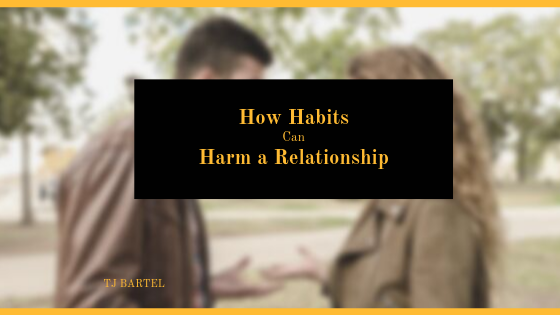A habit is defined as, “a settled or regular tendency or practice, especially one that is hard to give up.” You can think of them as the things we do on auto-pilot. Sometimes they make us feel good – like the habit of drinking water first thing in the morning or the habit of reading a few pages from a favorite book before bed. Sometimes they don’t – like the habit of replaying the awkward moments from our interactions with others, or the habit of reaching for potato chips when we are anxious.
Everyone has their own habits, whether they consider them good or bad, healthy or unhealthy. Most people might not think twice about their habits, especially if they seem to be harmless. But when applied to a relationship, unexamined habits can actually create quite a rift if allowed to go on unconsciously.
Habits and routines can actually lull us into a kind of numbed out life leading to loss of interest in different and new experiences over time. For example, if your daily routine consist of going to work, greeting the same few coworkers, picking your kids up from school afterwards, then coming home and making dinner, hitting the tube and then bed, that repetitiveness causes your brain to go into autopilot, lessening the meaningful interactions you could be having every day. It deadens your openness to novelty and trying new things just because you are in an unexamined habit. This same type of routine and loss of interest can occur in long-term relationships.
Mundane interactions and consistently identical routines cause couples to think less about what they are doing day to day and less about what their significant other is doing as well. This commonly leads to diminishing emotions and a loss of passion. Even worse, should those habits be more bad than good, a vicious cycle is created in which these habits are continued despite efforts to work on them. For example, responding to your partner’s question or comment with anger because of how often you have heard it; something that increases the amount of toxic interactions.
According to social psychologist Wendy Wood, couples can prevent their habitual nature from damaging their relationships through something she calls “habit discontinuity.” Seeing as your daily life is made up of a steady stream of habits, both conscious and subconscious, there is a mix of productive ones and useless ones that continue to manifest through their many years of conditioning. However, that is not to say they cannot be undone.
Opportunities arise throughout life through which you can change your habitual ways. Major life events such as marriage, moving households, or even starting a new relationship all give you a chance to reset emotionally. New habits can be created, pushing old or harmful habits aside. These bigger life events are not necessarily the only way to change, however. By investing some time and attention in being mindful of your own habits, how they apply to your daily life, and whether or not they are benefitting or hurting you, allows you to become more aware and work to change them.
“Habit discontinuity,” as Dr. Wood calls it, reintroduces passion and romance to an otherwise dull relationship. Something as simple as time spent apart can be considered a discontinuity, whether it’s traveling for business or visiting a distant relative. Resolvable arguments are even considered discontinuities as well. Small conflicts force both you and your partner to share your feelings with one another and work to resolve the issue at hand, thus increasing affection.
You can also create that habit of trying something new together once a week. Just choose a day or evening for your “adventure” and alternate who is responsible for finding the novel experience to try each week. If weekly sounds like too much, try monthly. Look at the tourism sight for your city, or check out Trip Advisor, for things to do in your area. Most people rarely see or do all there is available in their home town, saving adventures for vacations in other places. Making adventure dates with your beloved can go a long way toward breaking out of habitual relating to life and each other and boost the passion you feel.
